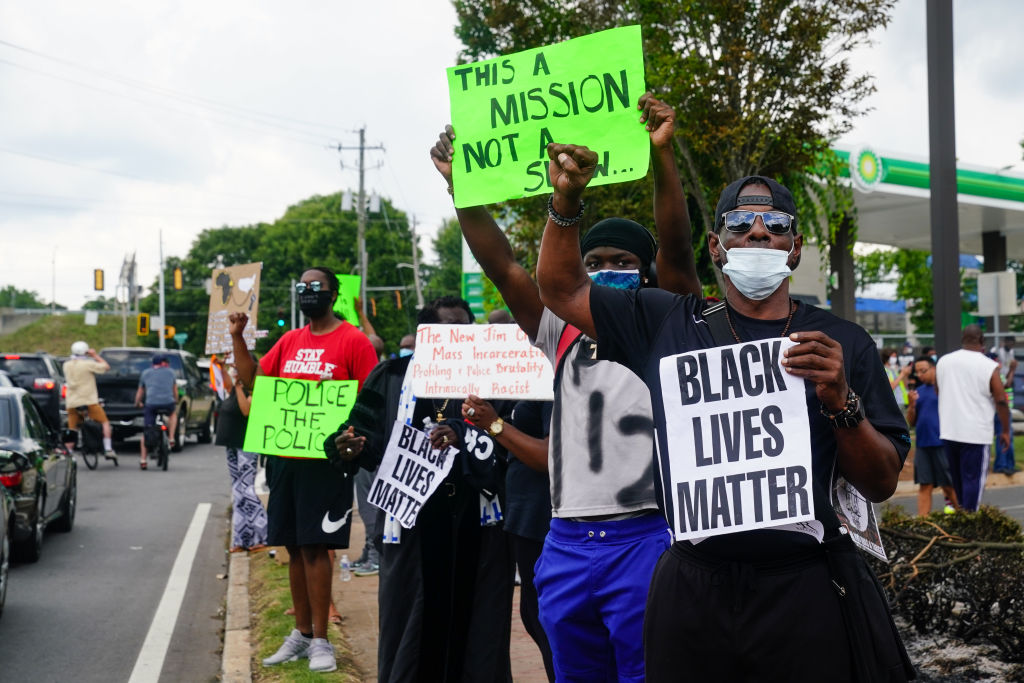Grand Jury Indicts 2 Officers Accused Of Shooting Black Georgia Man 76 Times On Charges Including Murder, Burglary And Making False Statements
Source: ELIJAH NOUVELAGE / Getty
On August 5, 2016, law enforcement officers in East Point, Georgia, fatally shot Jamarion Robinson, a 26-year-old Black man who reportedly suffered from mental illness, 59 times leaving his body with 76 bullet wounds. “Why in the world would it ever be necessary for officers to shoot one man that many times?” you might ask. Well, unfortunately, it’ll be an uphill battle getting to the truth on that matter as none of the cops involved in the shooting were wearing body cameras. The good news, however, is that two officers alleged to be the shooters were indicted by a grand jury on Tuesday—more than five years after the shooting—on multiple charges, including felony murder.
According to CBS News, Eric Heinze, an assistant chief inspector with the U.S. Marshal’s Southeast Regional Fugitive Task Force, and Kristopher Hutchens, a Clayton County police officer working with the task force, were charged with felony murder, aggravated assault, burglary, making false statements and violation of oath by a public officer.
First, let’s start with what we know about what happened in 2016.
U.S. Marshals said they were attempting to arrest Robinson at his girlfriend’s home at the request of Gwinnett and Atlanta Police on warrants from two separate incidents. According to CBS, police believed Robinson to be a man who had pointed a gun at Atlanta police officers and fleed the scene. (Even if that turned out to be true, who’s more dangerous—the guy who pointed a gun and ran without firing a single shot, or two cops who felt the need to shoot a human being nearly three dozen times?)
Robinson’s mother, Monteria Robinson, told 11 Alive she was the one who called police over one of the incidents, but not to have him arrested. Instead, she said she was trying to get her son mental health assistance as he had been recently diagnosed with paranoid schizophrenia. She also said the police were aware of his illness.
The Atlanta Journal-Constitution reported that East Point police claimed officers returned fire only after Robinson fired the first shot. Whether that’s true or not is unclear, but CBS reported that Monteria hired a private detective who found evidence of gunshots fired straight into the ground where Robinson’s body was lying.
“Over 90 rounds were fired at my son, flash-bang grenades were thrown at him, landed on him, burning him,” Monteria said during a news conference last year. “Somebody walked up the stairs, stood over him, and shot down into his body two more times. After that, he was handcuffed and drug down a flight of stairs.”
The family reacts to the news of the indictments in the Jamarion Robinson case. #JusticeforJamarion #JamarionRobinson. #Blacklivesmatter pic.twitter.com/Jcfep0jytl
— Gerald A. Griggs (@AttorneyGriggs) October 26, 2021
A civilian’s cell phone video recorded nearly three minutes of shooting from outside of the home, but that’s the only available video evidence because, at the time, federal policies didn’t allow U.S. Marshals or local police officers assisting them to wear body cameras.
“Why in the hell would any law enforcement agency not only fail to make its officers wear body-cams but actually have a policy disallowing them to?” you might ask. Well, there’s no clear answer to that question, so it’s easy to speculate that some police departments simply don’t want the actions of their police officers monitored—you know, in case they need to shoot someone 59 times and get away with it.
According to 11 Alive, Robinson—who had been a college football player at Clark Atlanta University and Tuskegee University—had no prior criminal convictions. An attorney representing the family, Mario Williams, said Robinson’s case is horrific and egregious, but not unique.
“It’s all the Jamarion Robinson stories that are not being covered, that are not on people’s radar, that are really important to grow this society,” Williams said. “When you have a situation that has occurred throughout the country, where a story gets highly publicized and there’s a lot of pressure, a lot of people realize if you don’t get an indictment, this city might get burned down.”
SEE ALSO:
[ione_media_gallery id=”3440564″ overlay=”true”]

